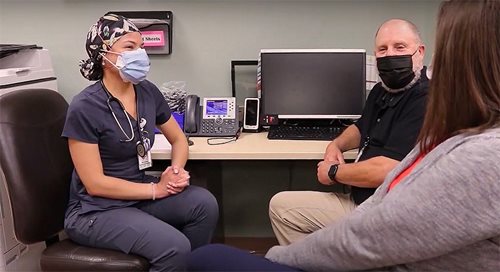When Ken Katz, a clinical social worker and certified trauma specialist, returned to Community Regional Medical Center after a 20-year break working in law enforcement, he couldn’t believe the added pressure and new challenges employees were up against. Katz had overseen the mental health department at the downtown hospital from 1984 to 1996 before the Level I trauma and burn centers were added. “The difference was palpable. The stress level of being a Level I trauma center is just incredible, and that spurred my interest in supporting employees.”
Katz had overseen the mental health department at the downtown hospital from 1984 to 1996 before the Level I trauma and burn centers were added. “The difference was palpable. The stress level of being a Level I trauma center is just incredible, and that spurred my interest in supporting employees.”
Then the pandemic hit and worry and stress increased — especially in the early days when we were discovering how to protect against and treat COVID-19, and when everything seemed to be in short supply.
Katz looked at what other healthcare organizations were doing and worked with Community Health System’s human resources to build a rapid response team of social workers and mental health specialists. The team helped frontline workers dealing with a new disease, patient surges and staffing challenges as healthcare workers also got sick. Community’s new Resiliency Response Team started rounding in units hit hardest by COVID-19 but soon other hospital departments were asking for help.
A commitment to caring for employees
Made up of six members, the Resiliency Response Team partners with hospital chaplains and social workers to be a sympathetic ear, listening to frustrations and helping employees mentally unload after tragedies or challenging days. Often, managers call the team to come do a group session after a tough week.
“I can’t tell you how many times I’ve heard from travelers (clinicians on short-term contracts) who say, 'Wow, I’ve never been to another hospital that does this. Thank you for the support!'’’ said Brandy Lidbeck, a licensed marriage and family therapist who is a member of the Resiliency Response Team. “There’s been a lot of appreciation for the program.”
The Resiliency Response Team is just one of the ways Community works to care for its employees, including 24/7 mental health resources, online group therapy, periodic chair massage breaks, bringing conveniences like car detailing services to employees, and having a fitness center with free personal trainers on the Community Regional campus. As the region’s largest private employer with 10,000 team members, Community is committed to providing a safe, nurturing and fulfilling workplace where employees can grow their careers.
Person-to-person support helps avoid burnout
While Lidbeck has served as the chair of the Fresno County Suicide Prevention Collaborative and led the crisis response for the LOSS (Local Outreach to Suicide Survivors) Team of Fresno County, she was nervous about coming into a hospital during a pandemic. “I had a little anxiety because I had never worked in hospitals and I don’t know the language … But I found it’s just really about that person-to-person support that you can do without knowing all the acronyms.”
Lidbeck said she quickly learned to mostly listen as nurses talked about being overwhelmed, juggling home worries with really, really sick patients — many of whom couldn’t have all their family visit because of COVID-19 safety restrictions. “There was a huge gamut of issues,” she described. “Maybe they were going through a divorce at the same time or maybe their own parent had just died. Everything just collided during the pandemic and they were just overwhelmed.”
Katz and Lidbeck are grateful to be that pressure valve to support nurses, respiratory and physical therapists, and environmental services workers suiting up in protective gear to do the hard work of protecting and caring for others. “These heroes are much better at giving care than receiving care,” Katz noted. “We’re really neutral and here to just provide that support they need.”
Lidbeck added, “I think it’s an honor to hear their stories. To get just three or five minutes with them before the next alarm goes off. They say ‘thank you’ and I walk away not having done anything therapeutic but listen.”
See this story on MedWatch Today


.jpg?language=en-US)


